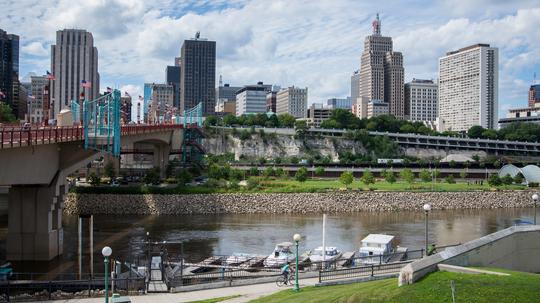
The big stories out of St. Paul’s tech and startup scene in recent years seemed to focus on who was leaving.
First it was LeadPages, a venture-backed lead gen platform that left COCO’s Lowertown location in 2014 for a larger space in Minneapolis’ Warehouse District (they’re now at over 150 employees). Last April, Cray Inc, a supercomputing company formerly based in downtown St. Paul, moved its 350 employees to a Bloomington office facility connected to Mall of America. Finally, scheduling tech startup When I Work announced last August it would move from the Drake Building just across the river from downtown St. Paul to the North Loop in Minneapolis as it was poised to nearly double its 100-person workforce.
From those tech companies alone--estimated growth included--that’s a loss of roughly 700 jobs, $62 million in venture backing, and one public tech company (Cray). Not a great sign for a city that’s been slow to bounce back from the recession (job numbers in 2015 were on par with those in 2007, according to the city’s 2016 Market Watch report), and whose Mayor pledged to add 3,000 jobs to the city by 2019.
But a group of St. Paul founders, technologists and politicians believe in telling a new story about the capital city's startup scene. One that’s not only about who stayed, but who’s going to grow and push the Twin Cities startup ecosystem forward.
It started in February, as Mayor Coleman and Councilmember Chris Tolbert formed the Innovation Cabinet, a group of 16 experts in startups, tech, economic development, real estate and politics who are researching ways to improve St. Paul’s innovation economy. They’ve been meeting since February, and plan to release an action strategy in September. Then earlier this month, Ecolab sold its 20-story tower at 370 Wabasha St. in downtown St. Paul to real estate firm PAK Properties and a handful of local investors, who are redesigning the building to include flexible office space targeted at fast-growing companies.
“We know the more that we can attract innovative companies, the more innovative companies will want to be a part of what’s happening,” said St. Paul Mayor Chris Coleman in an interview earlier this spring. “There is just a sense of that momentum that you see in the North Loop. We’re starting to see that in St Paul, but we want to try to accelerate that.”
It's a move that St. Paul advocates say is important not only for St. Paul but for further boosting the Twin Cities' reputation as a growing startup hub, which ranks 37th on Kauffman's most recent Startup Activity Report.
“I think a strong St. Paul is a critical component of a strong Twin Cities economy,” said Scott Burns, a serial entrepreneur based in St. Paul. “Without continuing to focus on St. Paul’s innovation sector, we’re going to miss that opportunity as a region.”

Making Space for Growth-Oriented Startups
The goal of most startups is to grow, and grow fast. This can make finding an office space challenging, as a founder needs flexible space (or at least a lease) that will allow for quick expansion in the future. In St. Paul, founders say that finding a lease that fits those needs is next to impossible. And likely led, in part, to the above startups leaving town.
"Both Cray and When I Work really were challenges with making sure we met the space needs of a company," said Mayor Coleman. "It wasn’t a lack of desire to be in St. Paul."
But a recent decision by Ecolab, a longtime booster of the St. Paul economy, could change that. When Ecolab decided to sell its old headquarters in the midst of a move to another St. Paul office tower, they specifically chose developers that were focused on bringing better office space to the city.
The 280,000-square-foot redesigned building, called Osborn370, will have a coworking space, professional office suites, options for flexible lease terms, as well as events and programming to connect more of the innovation workers in St. Paul.
Burns, an investor in the project who’s working to bring tech companies into Osborn370, has always been an advocate for St. Paul. It's where he cofounded his first company in 2000, gov tech startup GovDelivery which sold to Vista Equity Partners for $153 million (it’s now merged with Granicus) and where he just launched Structural, his second startup. But Burns notes that even he had difficulty finding the right space for GovDelivery in St. Paul as the startup grew. The city’s base of office space has declined by 1.7 million square feet over the last 10 years, as housing was built up according to the Minneapolis/St. Paul Business Journal.
“Osborn is not set up to recruit companies away from Minneapolis or set up St. Paul in some foot race against our amazing neighbor city,” he said. “It’s set up so when a company is interested in locating there, they have the kind of space that they want.”
"I think a strong St. Paul is a critical component of a strong Twin Cities economy"
Burns said there are several software companies who have agreed to move into Osborn, but declined to mention names as the deal is slated to go through July 1.
But it appears to already have caught the eye of growth-oriented startups. Mark Galloway, founder of sales tech startup OppSource, which just raised $1.22 million, said he plans to move the startup from its current office in COCO Lowertown (the only coworking space in St. Paul) to Osborn370 as he hopes to expand to 15 employees by the end of the year.
While Burns believes in the need for better spaces, he scoffs at what he says are Minneapolis misconceptions about the difficulty of building in St. Paul, including that it’s harder to recruit talent. If anything, he thinks having tech companies clustered in downtown Minneapolis makes growing an ecosystem more difficult, as any tech talent living in the East metro suburbs may not be as keen on a longer commute through two downtowns.
The leadership team at St. Paul-based Docalytics, a document analytics startup that was bought by Contently last year, agreed.
"As we start to grow, we have an advantage with anyone who is on this side of town," said CTO Ryan Morlok.

The Brooklyn to Minneapolis' Manhattan?
Galloway has been building software in St. Paul since he met his cofounders over a decade ago while working at St. Paul-based Lawson Software. While he said he’s long been a fan of St. Paul’s "relaxing" nature, he's also been excited to finally see an improving restaurant, bar, food truck and nightlife scene.
Construction projects are booming across St. Paul and with the new Saints minor league baseball stadium, a soon-to-be-constructed Major League soccer stadium in Midway and re-emerging restaurant and nightlife scene, amenities are growing throughout the city.
“From an environment perspective all the pieces of the puzzle are coming into place,” Galloway said. “More of that kind of thinking will bring it to life even more.”
That's what appealed to the cofounders of video management startup Ilos when they returned from a stint at Techstars cloud accelerator in San Antonio.
Ilos is located in the Gilbert Building in Lowertown, just across the street from Mears Park where food trucks line up each day in the summer and on the same block as trendy restaurants such as the Bulldog and Ox Cart Ale House. Being at the center of an up-and-coming cultural hub in the Twin Cities is key for recruiting as Ilos is gearing up to be at 25 employees by the end of the year, said cofounder Sean Higgins.
"To get the best people you have to have something that’s really unique," he noted. "And if you’re making the same points as Target Corporate is making for recruiting, you’re probably not doing a good job at it."
Along those lines, longtime local founders say it will be important to differentiate St. Paul's unique personality when it comes to attracting new companies.
“The vision for St. Paul that we’re working on right now is to be the Brooklyn to the Manhattan,” said Jonathan Anderstrom, cofounder of web design firm Creed Interactive. “An ecosystem that is connected yet has a separate identity from Minneapolis.”
Creed Interactive certainly has the Brooklyn narrative down: They've been located in Lowertown St. Paul for a decade ("before it was cool" Anderstrom said) and were attracted to this part of town for its affordable rent and artist community (they've used their space as a gallery for the annual St. Paul Art Crawl). They recently purchased and entirely renovated a loft-like, light-filled Lowertown office.
"It is overlooked a bit, and takes more energy to see the potential," said Anderstrom. "But because it is more raw, there’s a greater upside to it. In St. Paul you have a chance to make a name for yourself."
"The vision for St. Paul...is to be the Brooklyn to the Manhattan"
And the "Brooklyn" identity could also translate to a more diversified innovation economy, said Councilmembert Tolbert, who's heading up St. Paul's Innovation Cabinet.
"We need to embrace innovative technologies," he said. "It doesn’t matter if it is an app on your phone that’s going to employ numerous people, it doesn’t matter if it is Primordial Soup, making parts for doctors in surgery, or a brewery."
"20 years ago if someone said we’re going to have huge job growth in breweries, I think we all would have been ok, let’s not rely on that," he said. "But it’s changed."

The Journey Ahead
But for all the momentum moving forward, there's also a sense that St. Paul is still just out of the gate when it comes to building a strong innovation economy.
Galloway, cofounder of Oppsource, would like to see more venture capital activity--their most recent investor was based in Montana--connections to Fortune 500 companies, and startup density that can lead to serendipitous networking.
"[In Minneapolis] there’s so many startups in Downtown and Uptown and in the Warehouse District," he said. "You can’t even run into a coffeeshop without rubbing elbows with people in a very similar situation. That’s not the case yet in St. Paul. It’s going to take time and it's going to take leadership."
"We wanted to be in a place that felt like it was betting on itself as well."
And Burns notes that Osborn370 won't be the the end-all answer to St. Paul's space issues.
"I don’t think Osborn370 magically solves the problems forever," he said. "It allows us to capture more of the opportunity and it will open up all new bottlenecks and opportunities in front of it."
But for those who have started up, and stayed, in St. Paul, the challenges and opportunities are what have kept them growing on the East Side of the Twin Cities.
"I think of St Paul, and especially Lowertown, as the up-and-comer," said Higgins. "When you’re creating a new business, you’re taking some bets. And we wanted to be in a place that felt like it was betting on itself as well."








